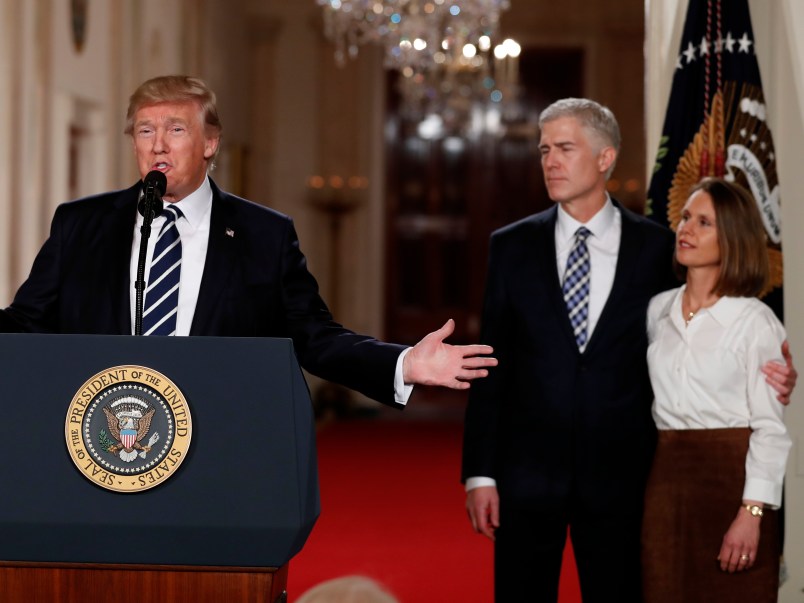When conservative groups spent millions of dollars to keep Justice Antonin Scalia’s Supreme Court vacant until a GOP president could fill it, Monday’s sweeping pro-LGBT ruling was just the kind of opinion they were trying to prevent.
The blockbuster opinion was written no less by Justice Neil Gorsuch, whose presence on the court was made possible by the Faustian bargain social conservatives made in electing Donald Trump.
As a candidate, Trump promised that he’d nominate the type of judges that they’d be happy with. To make this point explicit, his campaign released a list of potential Scalia replacements that quickly got the approval of the Heritage Foundation and other influential conservative voices.
The Trump campaign’s approach was effective and it may be what ultimately put his longshot campaign over the edge. The one-in-five voters who in exit polls said that the Supreme Court was the issue most important to them broke decidedly in Trump’s favor.
Gorsuch’s name was on the second iteration of the SCOTUS shortlist released in Sept. 2016. Once he was confirmed to the bench, “But Gorsuch” became the refrain among conservatives to wipe away all sorts of Trump misdeeds; a stress ball with Gorsuch’s face and that slogan was even handed out at a 2017 Federalist Society event.
On Monday, the 52-year-old crossed the forces that helped put him on the bench by authoring a majority opinion that gave the LGBT rights movement a seminal court victory. In an opinion backed by Chief Justice John Roberts and the court’s four liberals, Gorsuch said that 1964 Civil Rights Act’s protections against sex discrimination applied to workplace discrimination against LGBT employees.
“When we’ve gone so all-in on Trump and expected rulings that would leave religious conservatives pacified or pleased, this is egg on their face,” Andrew T. Walker, professor at the Southern Baptist Theological Seminary, told TPM. “You spend all this time telling yourself you can justify voting for someone who is tremendously flawed to get these great judges and get this utter failure of a ruling.”
Walker, who once considered himself a never-Trumper, has since become a reluctant supporter in large part due to his religious convictions.
To add insult to injury, Gorsuch framed his approach as growing out of the textualist tradition championed by the justice he replaced — a tradition in which courts set aside the intents of a statute’s drafters to look squarely at what the text of law itself says.
The invocation prompted an all out tizzy-fit from Justice Samuel Alito. And while social conservatives had come to begrudgingly accept that the Chief Justice John Roberts would occasionally swing with the court’s liberals, seeing Gorsuch join him — and author the majority decision — also packed a punch.
“I was thinking it would perhaps be more of a five-four decision with Roberts the unknown quantity, as to which way he was going,” Mat Staver, whose law firm Liberty Counsel spearheads cases for religious causes, told TPM. “I didn’t expect Gorsuch to be behind a decision like this.”
Roberts received major blowback after he broke with the conservatives in 2012 to uphold the Affordable Care Act. Roberts’ second ruling in its favor — coupled with then-Justice Anthony Kennedy swing vote in favor of same-sex marriage — inspired another round of conservative outrage that culminated in a Senate hearing on ideas to “rein in judicial tyranny.”
“Roberts, among conservatives, is not regarded as someone reliably conservative — it would be tragic if Gorsuch was put in that category, but sadly, today’s ruling kind of gives that impression,” Walker said.
“I don’t think Gorsuch is a traitorous progressive or anything,” he was quick to add. “I think he made a mistake.”
Trump himself exploited the betrayal conservatives felt toward Roberts during the 2016 campaign, calling the chief justice “a nightmare for conservatives” and blasting his primary opponent Sen. Ted Cruz (R-SC) for supporting Roberts’ confirmation.
It’s unclear whether the current ire towards Gorsuch will as be long lasting as what conservatives now feel towards Roberts. Walker hinted that “good pro-life rulings,” perhaps a decision on abortion regulations that the Supreme Court is due to hand down any week now, “would mitigate skepticism that religious conservatives have about Gorsuch.”
But for now, some of Gorsuch’s biggest boosters are emitting a bit of buyer’s remorse.
Carrie Severino — who leads the Judicial Crisis Network, the dark money group that spends millions supporting conservative judicial nominees — has tweeted at length about her frustration with Gorsuch’s decision.
She said it amounted to a “hijacking of textualism” and that “Justice Scalia would be disappointed that his successor has bungled textualism so badly today, for the sake of appealing to college campuses and editorial boards.”
Conservative legal activist Ed Whelan said at the time of Gorsuch’s confirmation that he was “brilliant jurist and dedicated originalist and textualist,” and an “eminently worthy successor” to Scalia.
On Monday, Whelan described himself as someone who had “much higher expectations for Gorsuch (and for the Chief Justice),” while warning of the “extreme consequences” of Gorsuch’s ruling.
He and other conservatives also alluded to the “But Gorsuch” refrain meeting its death.
— Ben Shapiro (@benshapiro) June 15, 2020
Others predicted political consequences for President Trump himself, if social conservatives, disheartened by the decision, didn’t show up at the polls the way they did.
Staver said he doubted Monday’s decision would be held against Trump because the President “would not have known at that time” of Gorsuch’s nomination that the justice would have ruled this way. But, Staver said, it still “definitely frustrates people.”
“For many people, [the Supreme Court] was and still is the most important part of the election process,” he said. “They wouldn’t have expected something like this, of Gorsuch.”
Correction: Due to a transcribing error, an earlier version of this story misquoted Mat Staver. He said that Trump “would not have known at that time” of Gorsuch’s nomination that Gorsuch would vote this way in the Title VII case.



